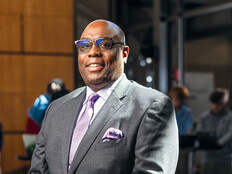Taking Common Core’s Temperature
It's difficult to find anyone who works in K–12 education who hasn't heard of the Common Core State Standards Initiative.
For months, schools have been working to ensure that their networks can handle the online student assessments that the standards require; that there are enough computers for all students to complete the test; that teachers and staff are trained to administer the test; and that their English language arts and mathematics curricula align to the standards.
CDW•G research conducted this spring confirmed that district IT leaders consider Common Core preparation a top-three — if not the highest — priority. (Read full results of the 2013 Common Core Tech report at CDWG.com/CommonCoreTech.)
But what do the general public, parents and educators think of the standards? Surveys of these groups by PDK/Gallup and the School Improvement Network reveal a lack of awareness and mixed support.
The PDK/Gallup poll, for example, found that 62 percent of surveyed American adults know nothing about the new standards. Of the 38 percent who have heard of Common Core, many believe (incorrectly) that the federal government is forcing states to adopt the standards and that all academic subjects are covered.
Meanwhile, two School Improvement Network surveys shed light on the parent and educator perspective. Fifty-nine percent of participating parents with school-age children have never heard of Common Core, it turns out; 62 percent of those who are familiar with the standards support them, 22 percent are opposed and the rest are ambivalent. By comparison, nearly 75 percent of the 3,077 teachers surveyed support adoption of the standards and believe Common Core will benefit students and the educational system as a whole.
Status Check
In spring 2015, the 45 states that have fully adopted the Common Core standards must administer mandatory student assessments online. How are districts in these states faring in their preparations? "Common Core Readiness Check: What Schools Have Done or Are Doing" offers a progress report on a few of them.
Even after Common Core becomes standard operating procedure for these districts, Dr. Dale Lynch, director of schools for Tennessee's Hamblen County Department of Education, warns that it may take longer for the teaching and learning benefits of the new standards to fully manifest.
"We know it will be challenging in the beginning," Lynch says. "The last time we changed the state standards, the test results were initially not very good. But we'll give our students time to engage in rigorous classes and challenge themselves as much as possible. They may not hit the mark early, but over time, the results will be good."








